A Competitive All-Electric Compact Crossover
The Kia Niro now offers three levels of electrification. The hybrid version extends the gasoline engine’s range for more miles per gallon. The plug-in hybrid (PHEV) enables battery power for local driving, but lets you take long trips using the gas engine. The brand-new EV moves you into a long-range, carbon-free future.
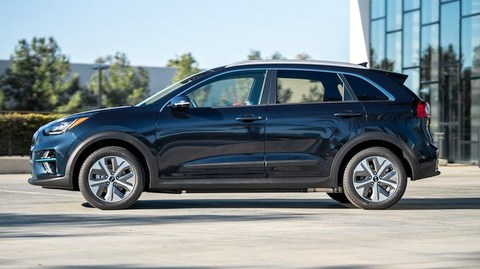
As a compact crossover, the Niro EV sits in a hot market segment. It’s so popular now that competitor Toyota is now selling more RAV4s compact crossovers than Camry sedans!
The 2019 Kia Niro EV earns 239 miles of range from its 64-kWh lithium ion polymer battery, cleverly one-upping its most direct competitor, the Chevrolet Bolt EV (238-mile range). The Kia’s electric motor, at 201 horsepower and 291 pounds-feet. of torque, is a bit torquier than the Bolt’s. EPA numbers are 123 MPGe city/102 highway 112 combined and a pair of perfect 10’s for the Green scores.
Bigger Than Bolt
The 2019 Kia Niro EV is a bit bigger than the Bolt EV, stretching 8.2 inches longer on a 3.9-inch-longer wheelbase. However, passenger volume is only 2.2 cubic feet more. If you want a Korean-built car that matches the Bolt EV in size, choose Kia’s sister division Hyundai’s new Kona EV, which uses the same powertrain as the Niro EV.
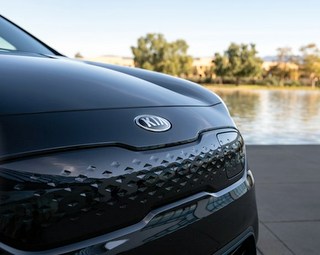
In a time of fierce and overstyled models, the Niro EV looks clean and purposeful. While some EVs remove the grill entirely, the Niro simply gives it a solid texture. The front features a mirror-image opening below the closed grill, and the lower corners flaunt accents with lights that look like airplanes in flight. The sides press in along the lower doors, a favorite designer technique to make the wheelwells stand out ruggedly.
The driving experience is smooth and quiet. All you’ll hear is a little tire and wind noise. One other sound appears in low speed situations, though, from the pedestrian warning system. The company is portraying it as a cool “fantastic techy whir of a sci-fi craft,” but I found it a little annoying. As more EVs penetrate the market, pedestrians will have to remember to use their eyes when stepping into the street.
4 Levels of Regen/4 Drive Modes
Regenerative braking adds charge to an EV’s batteries. For hybrids, it’s the only way, while for plug-in hybrids and EVs, it’s a nice boost. The 2019 Kia Niro EV lets you select from four options—ascending levels of 0, 1, 2, or 3, using the steering wheel paddles. I like heavy regen, but the level 2 setting seems about right for most driving.
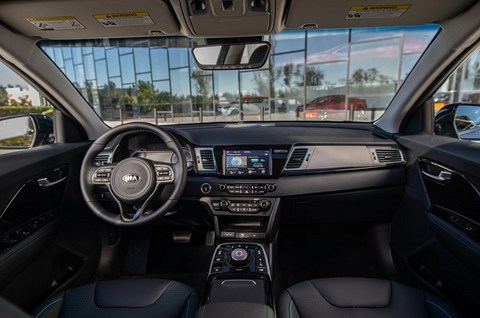
Select from four Drive Modes–Normal, Sport, Eco, and Eco+. Normal, the default, works fine, while Sport lets the motor spin freely and takes advantage of the motor’s instant torque. Eco and Eco+ reduce electricity consumption for maximum efficiency. Each level has its own set level of regen, but you can adjust it.
The 2019 Kia Niro EV comes in two trim levels—EX and EX Premium. The Premium adds niceties such as a sunroof, a larger 8.0-inch touchscreen, Harman Kardon premium sound system, heated front seats and wireless smartphone charging. My tester, a Platinum Graphite EX Premium, felt nice enough, but didn’t match luxury crossover EVs (in quality or price).
Charging Options
Charging works in the normal way, with a standard J1772 plug at home or at charging stations. Combined fast-charge capacity comes standard and is great for longer trips. On the Bolt EV it’s a $750 option. If you choose to use Level 1 household current (120V) it could take 2-1/2 days to refill an empty battery versus 9-1/2 hours for Level 2 (240V). Fast charging can refill to 80 percent in an hour. For most people, the car’s 239 miles of range will be sufficient with regular charging at home or at work.
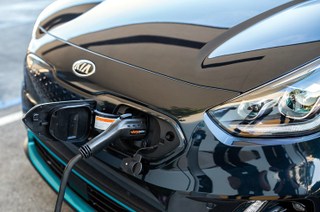
One area the Niro definitely has it over the Bolt, Nissan Leaf and even sister Hyundai Kona is in standard Advanced Smart Cruise Control and lane following assist. These are not even available on the Chevy and are options on the others (no lane following assist on the Kona). Three other safety features are standard on Kias and Hyundais but optional on the others: lane departure warning and lane keeping assist, forward collision avoidance and collision warning, and blind spot warning and rear cross traffic alert. I applaud the Korean brands for including them on all models.
Official pricing for the 2019 Kia Niro EV is expected to start at a competitive $37,500 for the EX. Kia has not sold 200,000 EVs yet, so you should be able to claim the full federal and state rebates and tax credits.
The 2019 Kia Niro EV is a very attractive package for style, comfort, efficiency and affordability. Kia is now seen as a quality and value leader, and by stepping strongly into the EV market, is keeping an eye on the future.
In order to give you the best perspective on the many vehicles available, Clean Fleet Report has a variety of contributors. When possible, we will offer you multiple perspectives on a given vehicle. This comes under SRO-Second Road Test Opinion. We hope you’ll enjoy these diverse views–some are just below—and let us know what you think in comments below or at publisher@cleanfleetreport.com.
Road Test: 2019 Kia Niro EV (John’s view)
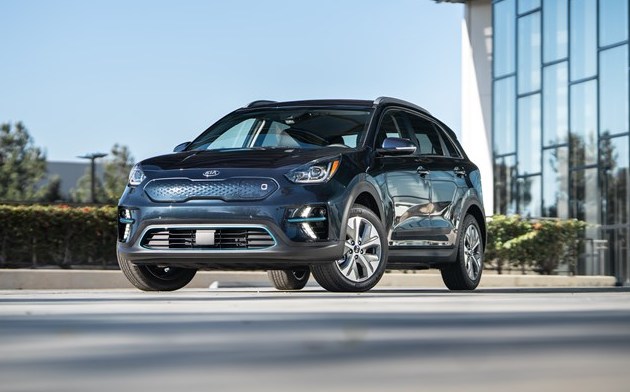
Related Stories You Might Enjoy—EV Choices Heating Up
News: 2019 Hyundai Kona Goes Electric
News: 2019 Hyundai Kona EV Details Revealed
Road Test: 2019 Chevrolet Bolt EV
Personal: Two Years with My Chevrolet Bolt EV
First Drive: 2019 Nissan Leaf Plus
Tech: Specs for 2019 Nissan Leaf Plus
News: $35,000 Tesla Model 3 Finally Goes On Sale
Make sure to opt-in to the Clean Fleet Report newsletter (top right of page) to be notified of all new stories and vehicle reviews.
Disclosure:
Clean Fleet Report is loaned free test vehicles from automakers to evaluate, typically for a week at a time. Our road tests are based on this one-week drive of a new vehicle. Because of this we don’t address issues such as long-term reliability or total cost of ownership. In addition, we are often invited to manufacturer events highlighting new vehicles or technology. As part of these events we may be offered free transportation, lodging or meals. We do our best to present our unvarnished evaluations of vehicles and news irrespective of these inducements.
Our focus is on vehicles that offer the best fuel economy in their class, which leads us to emphasize electric cars, plug-in hybrids, hybrids and diesels. We also feature those efficient gas-powered vehicles that are among the top mpg vehicles in their class. In addition, we aim to offer reviews and news on advanced technology and the alternative fuel vehicle market. We welcome any feedback from vehicle owners and are dedicated to providing a forum for alternative viewpoints. Please let us know your views at publisher@cleanfleetreport.com.

4 thoughts on “Road Test: 2019 Kia Niro EV”